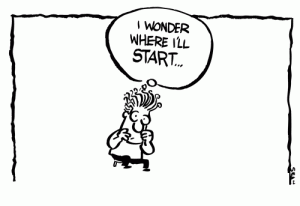
In any article writing outline you could start with just about any point of view. Your article could start off answering the questions “why, how, when” etc. So why start with “What”? And when do you start with “What”?
There's a simple answer…
“What” brings all your readers on the same page in a microsecond. The moment you tell me “What” you're referring to, I'm locked in to your wavelength. As a reader, I know “What” you're talking about.
And it's critical to have “What” at the starting point
Because if you don't, the reader is often meandering through your text trying to work out “What” you're referring to. But waitasecond, readers rarely meander. If they don't get answer to their question in a matter of seconds, or are confused by the direction, they just stop reading. And more often than not, the reason for this bail out is because you haven't answered the question “What” in the first place.
So let's take an example of a few headlines:
How Chunking Down Increases Your Expert Status
Why the Yes-Yes Factor Helps Bring Back Customers
The ‘Chocolate Theory’ of Creating Sequential Products and Services
All of these headlines attract attention because they've got these curious-sounding terms or specifics. This draws the customer in, but soon confuses them if you don't get to the “What” question early in the article.
But “What” doesn't apply to all article outlines
So if the concept is clear at the start: e.g. “How to increasing coffee prices”, you'll look like a propah idiot if you go about trying to explain “What” you mean by “increasing coffee prices”. It's only when you have something unusual or specific that you're going to need to get customers on the same page.
And some examples again where “What” isn't needed at the start
How to retain 90% of everything you learn
The Logical Case For Increasing Your Prices
Understanding What “Focus” Really Means
In summary:
1) Answering the question “What” enables the reader to be on the same page as you.
2) “What” is critical in situations where there is a chance of confusion e.g. when you use unusual terminology.
3) A confused reader bails quickly if you don't answer the question “What”.
4) “What” is not needed to start all articles. It doesn't need to hog the spotlight all the time.
So the next time you're writing an article, think about the reader.
Will they quickly grasp your point of view? Or will they be confused? If you have even the slightest doubts that the reader is not on the same page as you, make sure you slide in the “What” at the top. It helps calm the reader down and allows them to read the rest of the article without confusion.
——————–
“Now I hear my staff talking about implementing a new promotion and the first words they utter are “Ah but first we need to do a target profile.” “
I learned about Sean from a restaurant marketing friend. Normally I would have not gone anywhere with this new found information but I respect this guy a lot and he said that Sean is one of the best marketing minds around.
So I check out the Psychotatics website and I was hooked: so much information, so much common sense.
I bought the Brain Audit book and shared it with my key staff; it really was a revelation. We work very hard at marketing our business and at times it really does become overwhelming.
After reading the Brain Audit, it became much less complex and doable. Now I hear my staff talking about implementing a new promotion and the first words they utter are “Ah but first we need to do a target profile.”
We are looking at our existing and potential Guests more differently now that ever before.
Thanks, Sean. Looking forward to working with you and your products for many years to come.
David Bardon, Bardon Bowling Centers , WI, USA
Judge for yourself
Read how The Brain Audit can help you…
———————
5000bc—Get on the 5000bc Waiting List:
5000bc now has a Waiting List. The waiting list joining time is approx. 30-60 days. So if you are serious about getting your business to the next level, get on the waiting list now.
“I avoided joining 5000bc for a long time due to the cost, but I am glad I did.”
“5000bc had been recommended by a Caver, and I took a look at it. The cost of joining was small relative to my recent terrible purchase, but I was in no spending mood at the time…understandably.”
Within a couple days of joining, I soon realized that Sean walks the walk and talks the talk. Not only was Sean contributing to the forum, but the calibre and quality of the feedback from other members was invaluable and definitely free flowing.
What I found instantly on 5000bc were answers to my most pressing questions related to my business. That made the cost of joining 5000bc, even after only a week or so of being a member, insignificant relative to the value received.

Peter J. Draper, Equity Transitions Inc., Mississauga, Ontario.
Judge for yourself https://www.5000bc.com
———————
New Products: Introductory Price
1) Learn how to create drama and curiosity and help improve your web page conversion with visuals.
2) Does your websites, brochures, presentations, etc… confuse your clients? .
Put some sanity into your design, even though you are not a designer?
3) Do you sometimes wonder if planning books are written just for the ‘organised' people?
Learn Why Most Planning Fails: And The Critical Importance of Chaos in Planning.
4) Don't you just hate painful clients. Learn how to use the power of the ‘six critical questions' to get incredible testimonials—and attract clients that make every day an absolute joy.
———————

Thank you Sean. Again, you made me examine the way I write my blogs.